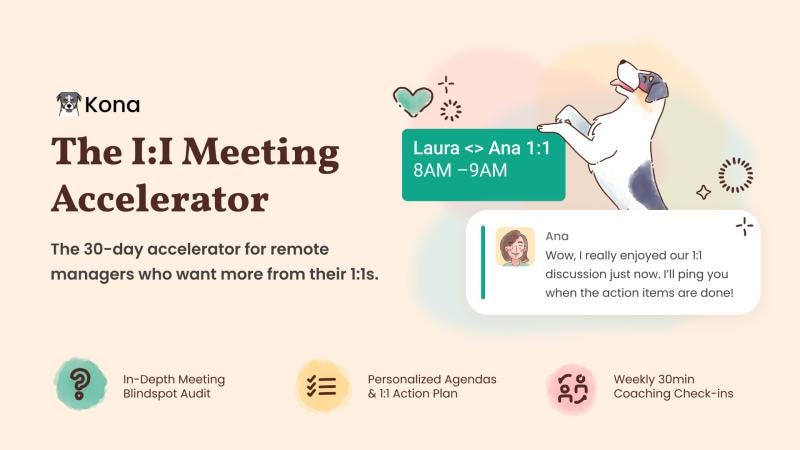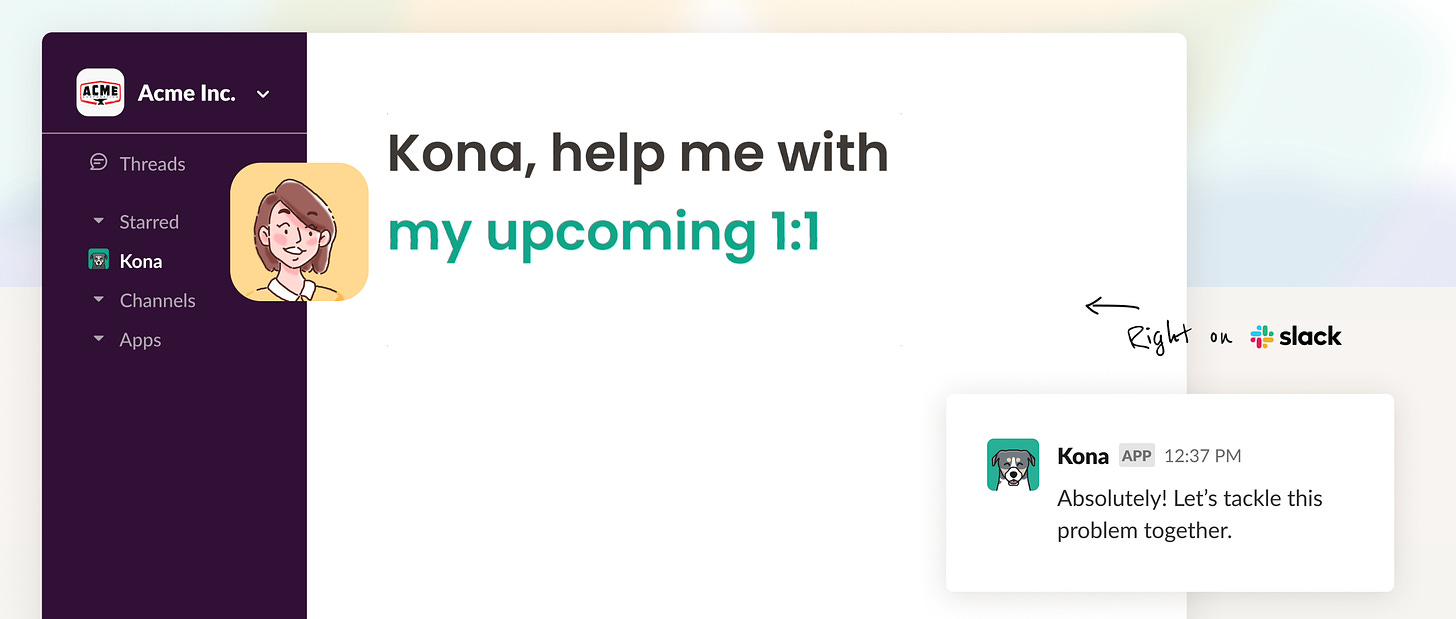Being a better people leader with Kona CEO Sid Pandiya
How Kona built a platform that uses data and AI to empower remote managers
Welcome to Day to Data - a dose of musings by a data scientist turned venture investor, breaking down technical topics and themes in data science, artificial intelligence, and more. New post every other Sunday.
Today’s Day to Data is about Kona, the AI-powered leadership coach for remote managers, which I learned about through an awesome conversation that I had with the CEO, Sid Pandiya.
While it doesn’t quite feel like it, remote work has been an operating model long before the pandemic. Some well known have been remote-first for decades, like Github since its founding in 2011. But it wasn’t until March 2020 that much of the world felt the weight of what it meant to be on a remote team and, for managers, the reality of leading a disparate workforce working across time zones and vastly different living situations. Managers were pressed to learn a new method of how to be effective. This is where Kona comes in.
This conversation taught me a lot about shipping early product, being a technical founder, and being creative to get closer to product-market fit. In a world where remote work is widely here to stay, there remains to be tremendous opportunity for tools like Kona to level up managers to be their best. Let’s dive in!
The power of communication skills
Since his early teens, Sid has loved solving problems that he had personal connections to. He was involved in the debate community growing up, which inspired his first project - a platform for kids to debate online. The idea of helping people communicate more effectively using technology and debate skills resonated - there was magic in understanding a problem and then solving it with technology. He pivoted to build a tool that taught communication skills in the workplace through the fundamentals of debate. These early builds and his interest in communication would play a role in guiding the products that were yet to come.
How the world showed up to work changed dramatically
“Each failure led me to my next company”, said Sid. And in October 2019, his past learnings led him to Kona. The founding team focused explicitly on managers of remote teams - they hypothesized that there were a lot of pain points in managing these disparate workforces.
“We interviewed 100 remote managers before writing a single line of code. We were college students just DM’ing people on LinkedIn. We’d ask people what they found difficult about managing a remote team. And then they started complaining - and it became obvious that managing a remote team was pretty hard.” - Sid
Then, in March 2020, something happened that no one could have ever expected. A majority of teams previously working in offices, stores, and other in-person means shifted to an entirely remote operating model. This global shift was the catalyst to the team going full time on Kona.
So what is Kona? Kona is an AI-powered leadership coach for remote managers. Kona understands your company, knows remote manager best practices, connects to all your internal tools, knows your strengths and weaknesses, and creates a personalized approach to being a better manager. Kona gathers contextual data from the manager and direct reports, as well as the context of the company and relationships, to be the executive coach for remote managers everywhere.
Building an MVP that excites your early customers
Sid built much of the initial Kona product while in school at UCLA. Now, a few years into being CEO, he is “very closely involved in all the architectural decisions we make. I think at the early stages so much of what we do is technical exploration - see what’s the limit of the technology to see what’s possible. So I’m spending a lot of time testing, playing around, and seeing what I can hack together”. And much of the building of an initial MVP is about this approach testing, learning, and hacking together solutions.
Kona is built on top of Slack. This was a huge unlock to move fast in the early days. Being built on top of Slack made it easy to ship real prototypes quickly. Slack is SOC2 complaint, HIPAA complaint, and has a slew of its own security best practices. Slack enables certain scopes of data access for external bots, which made it easy for the Kona team to start providing for a customer at a smaller scale, then grow with time as they gained trust and use of their tool. Sid credits the Minimum Viable Testing (MVT) approach to playing a huge role in how they shipped early products — Gagan Biyani’s article on the topic can be found here.
“In an MVP, you try to simulate the entire car. In an MVT, you are just testing whether the drivetrain is more powerful with an electric engine or a gas one.” - Gagan Bavani
In order to begin testing demand, without writing any code, Kona started the Remote Manager Accelerator. Over 30 days, they planned to build personalized coaching plans for participants to build one specific management skill that’s most important to you. They were overwhelmed with signups, opening up more spots, and quickly realized the demand was there. Their second learning was that it all came back to feedback. They were working alongside managers, seeing their struggles, particularly around giving back feedback within the context of their organization. In order to understand context for providing feedback and coaching managers, they did it manually. They reviewed managers’ calendars, they discussed their strengths and weaknesses, and talked through the hardest parts of their job. They took this manual context-building step and began the roadmap to productizing it.
Do things that don’t scale
One of the most famous quotes regarding building a company from Paul Graham, co-founder of famed startup accelerator Y Combinator, is to “do things that don’t scale”. An example Graham spoke to in his original essay on the topic was the “Collison installation”, referring to the Collison brothers’ approach to recruiting early users to Stripe.
More diffident founders ask "Will you try our beta?" and if the answer is yes, they say "Great, we'll send you a link." But the Collison brothers weren't going to wait. When anyone agreed to try Stripe they'd say "Right then, give me your laptop" and set them up on the spot. - Paul Graham
It’s an entirely unscalable effort for founders to set up every interested customer on the spot, but makes for a personalized customer set up, and builds out the initial user pool in a tangible way.
Kona’s approach to understanding context from their customers through accelerators and ride-alongs was manual and unscalable, but led them down the path of what they needed to build to deliver value to customers. Doing things that don’t scale can be incredibly insightful for the early days of building a business.
The future of Kona
“Kona is at a point where it’s giving out contextual advice that is really good”, says Sid, meaning that the tool is able to understand the intricacies of dynamics between team members, workplace structures, and context on the employee. Thanks to partners like Evolution Coaching, who has coached execs at Slack, Netflix, Microsoft, Google and others, Kim Scott, author of Radical Candor, and Amy Edmonson, who wrote the Fearless Organization, Kona has built a robust platform that combines research and psychology with exciting developments in data and artificial intelligence to empower remote leaders. “We want every manager to have the tools they need to succeed. Kona should be like a little birdie on your shoulder - a proactive guide that can analyze large amounts of data to turn it into targeted actions, so managers can stick to the important human elements of people management”.
You can find Sid and Yen, co-founders of Kona, on LinkedIn, where they regularly share resources and tips for remote managers.








Kudos to the author and the editor. I am happy to me out of the business of managing scores of people who, even working “in person,” came across as pretty remote. Instead, I’m trying to master being a technopeasant.